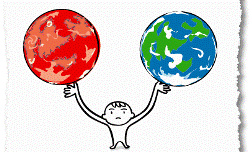India Voted as the Most Environment Friendly Nation in the world. Chance or Choice?

India was voted as the most environmental friendly and green country in the world by none other than National Geographic. Five seconds later, I smell leaves burning down my lane.
Since 2008, National Geographic has been carrying out annual surveys to measure Greendex: sustainable consumer behavior across the world. This year, the online survey was carried out in collaboration with Globescan-Global Public Opinion and Stake holder research, where 1000 people in each of the 17 countries were surveyed and asked about their consumption pattern in the following 4 areas:
| Housing | Size of residents relative to number of inhabitants, water usage, home and water heating, consumption of renewable energy etc. |
| Transport | The size of the vehicle that they owned, the distance that they traveled in their vehicle, air travel, public transport usage etc. |
| Food | The kind of food that they consumed (vegetarian or otherwise),whether they grew it themselves or imported it etc |
| Goods | The questions related to everyday consumption goods and big items like TV, willingness to pay an environmental premium etc |
The end result:
- India was ranked 1st overall for the 2nd time in environmental friendly behaviour.
- It was found that 42% of Indians were less likely to have home heating and hot running water. The less energy you waste in heating your house and water, the more environmental friendly you are.
- 49% of the Indians that gave the survey neither rent, own nor lease cars or trucks while 67% proffered motorcycles or scooters and at least 81 % use public transportation once a month. The smaller and the lesser the number of vehicles on the road, the less CO2 you produce.
- When it comes to goods like televisions, refrigerators etc, India ranks at top as Indian consumers prefer to buy used rather than new (42%) and to repair rather than to replace (68%). They also increasingly buy products that are environmentally friendly (60%).
- 35% of the Indians eat self grown food several times a week if not daily. The less food you import, the less fuel you waste in importing it and hence the more environmental friendly you are. Also, consumers in India rarely consume meat, including chicken (24%), fish & seafood (21%) and beef (13%). The longer the food chain, the more sustainable it is.
- Indians are also becoming increasingly concerned about environmental problems in general (76%). More Indians feel guilty about their impact on the environment (58%). In particular, they are more likely than most to worry about climate change or global warming (83%), fresh water shortage (85%), and loss of species and habitat (70%).
Knock Knock!! Are we helping the protection of the environment by chance or by choice?
Do you forget the fact that we face the sun’s torturous rays almost throughout the year? When we say that we Indians are less likely to install a home water heating system we forget to mention the fact that we hardly need it!
After all, we are a young nation robbed by the Britishers. Sixty years after independence, 42% of India falls below the international poverty line (World Bank, 2005). If 49% of us Indians do not own, rent or lease cars and trucks then it is not because we love the environment so much, but because we simply cannot afford these expenses. Don’t we prefer to repair our damaged television or buy a second hand fridge instead of a new one so that we can save money? Environment conservation. Really? India has always been an agrarian country not to mention a religious one too. I don’t think a typical Indian family would consume less beef to save the environment. Hindus don’t eat beef! The gates of heaven shut down for you if you do!
I do not intend to show how stingy we Indians are. It is true that we Indians do our best in every possible way to cause as less damage to the environment as possible. What I am trying to say is that the questions involved in this survey cannot determine the level of concern we have for our environment. India earn its position not because it is environmental friendly but because of the fact that being eco-friendly has been a way of life for us ever since the beginning of our civilization. So the big question is
Do you think the questions asked in this survey are appropriate for a country like India? or Should we just celebrate that we came first in a survey?…(without even working hard for it)
It seems that the fruits of cost cutting by millions in India has been rewarded after all, even if it does nothing to lower down the prices of the goods we most commonly use.
This post has been submitted by our SOIP candidate Saloni Tandon.




it is an interesting article.was happy tht my india is so eco-friendly but its not so.anyways i guess now as more people will read this particular article they will become more conscious of making their india a real ECO-FRIENDLY country rather thn just because of customs n traditions n poverty.
I think you make a valid point: tradition, circumstances, and, yes, poverty all have something to do with this.
Still, I think we should celebrate the positive aspects of what we are doing. The rich countries need to learn from us in some ways. From my point of view, often low-tech, traditional things are better than high tech ones. Maybe we need to export matka, pressure cooker and water cooler technology! Maybe we can teach Americans that a little sweat never hurt anyone; that they wouldn’t need so much hot water if they turned off the AC sometimes!